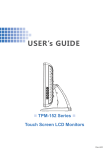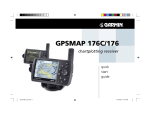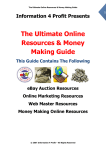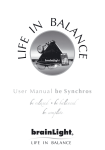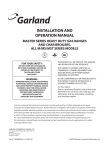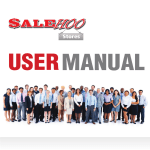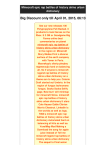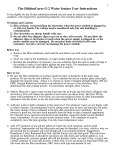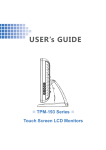Download Untitled - SaleHoo
Transcript
USER MANUAL NEW USER MANUAL THE SALEHOO NEW USER MANUAL Almost Everything You Need to Know About Using Suppliers Hello, welcome to SaleHoo! Have you ever ordered from a wholesale supplier before? No? Then it’s really important that you read through this guide before getting started. Even if you have used suppliers before we still recommend having a flip through. Because if there is one thing for certain in this business, it’s that there is always more to learn! In the SaleHoo New User Manual, we explain how to get off on the right footing with the suppliers you would like to work with and lay the groundwork for negotiating the best prices and creating long-term relationships. The SaleHoo directory takes a lot of the pain out of finding a supplier because we have already checked that the companies in our directory are legitimate. We’ve also checked they are genuine suppliers and asked them quite a few probing questions about their business – the answers to which you can find in the More Information section on each supplier listing. But even with all this work out of the way, you’ll soon discover that finding a supplier still requires a bit of effort from you. And that’s what this guide is all about. Ordering from a supplier is quite different to ordering a DVD from Amazon. In fact, it’s kind of more like dating: It can take a bit of looking around before you find a supplier you really hit it off with; you need to chat to your supplier quite a bit to get to know them; and not all suppliers are right for your business! We all know how uncomfortable and frustrating a bad blind date can be so there’s no need to repeat the pain with your quest to find suppliers. The other extremely important thing we are going to cover here is wholesale price. What is it? How do you tell if you are getting a ‘real’ wholesale price? How can you get the best wholesale price? Why are some sellers on eBay selling items at the wholesale price, or even below? The information you are going to learn here is absolutely essential to sourcing products to sell online, especially on eBay. To sum up: Taking the time to read this guide will save you HOURS of wasted time in the future – and a lot of heartache as well. Quite simply, if you want to play this game well, then you’ve got to know the rules first! Here’s what we’ll be covering in this guide: • Getting ready to use suppliers. What will suppliers want from you? How to get prepared. • How to find and use a supplier in SaleHoo’s directory • How to contact a supplier and what to ask • What are wholesale prices? • How to get the best wholesale price from a supplier • Placing your order • Frequently asked questions Copyright © 2012 SaleHoo Ltd. All rights reserved. No part of this ebook may be used or reproduced without permission from SaleHoo NEW USER MANUAL GETTING READY TO USE SUPPLIERS: WHAT WILL A SUPPLIER WANT TO SEE BEFORE APPROVING YOU AS A RESELLER? Before you can access a supplier’s wholesale prices and place an order, you usually need to go through an application process and be approved as one of their resellers. Not all suppliers are this formal, but most have at least a couple of requirements you need to meet before they will work with you. Doing some preparation before you contact a supplier will dramatically increase your chances of having your reseller application approved and ultimately getting the best wholesale deals, so it’s well worth the few hours of preparation time. What you need to use a supplier 1. A trading name or a registered company 2. A Sales Tax ID/Reseller Permit 3. Some ID You may also need: • Evidence of your retail outlet: URL or physical address • Business license • Trade references • Sales figures There are three things in particular that most suppliers like to see: 1. A trading name or that you are a registered company This shows the supplier you are a legitimate business and not just one of the countless individuals emailing them on a get-rich-quick mission. Most people starting a business begin a sole proprietor because it’s the cheapest and easiest way to structure a new business. If you choose this option, you should register a trading name or DBA because it gives you some liability protection and looks more professional. This can be done very easily at your local county clerk’s office and usually costs less than $30. Alternatively, you can consider incorporating your business. This is a more expensive and complex option, but it also gives your reseller application an instant credibility boost as far as suppliers are concerned. To incorporate, you’ll be looking at paying anywhere from $500 to $900 depending on where you live, and ideally you should consult a lawyer. If you want to know more about registering a trading number or company, just email our customer support team. Don’t forget to tell us where you live, as procedures vary from place to place. 2. A Sales Tax ID/Reseller Permit If you live in the USA or Canada, then you’ll find that wholesale suppliers in most USA and some Canadian states will ask to see your sales tax ID or reseller permit when you apply to be one of their resellers. This is very easy to get from your local County Clerk’s office, and can even be done online in most places these days. The fee, if any, is nominal. For more information on how to get a sales tax ID/reseller permit, have a read of our blog post: http://www.salehoo.com/blog/how-to-get-a-reseller-license-sales-tax-id Copyright © 2012 SaleHoo Ltd. All rights reserved. No part of this ebook may be used or reproduced without permission from SaleHoo NEW USER MANUAL Resellers outside the USA & Canada: You won’t need to provide a sales tax ID when you order from a US supplier. However, if you are using suppliers in your own country, you should ensure you have the equivalent, such as GST/VAT registration. 3. Some ID Suppliers may also ask to see a form of photo ID when you fill in an application. Other things some suppliers may ask to see: • Evidence of where you will sell the items, or proof of your physical store: Most applications will ask where you plan to resell the items. For designer/luxury brands, you are likely to need a physical store to be approved. • A business license: In some US states you need a business license to officially start and run a business. The USA government’s business website has an immensely useful tool that lets you search for your city and state and find all the licenses you need to start your business: http://www.business.gov/register/licenses-and-permits/ • Trade references: Some suppliers may ask for trade references on your application. A trade reference could be from your business bank account manager or any other business that has extended you credit. If you are a new business without trade references, let the supplier know you’ve just started and will be paying by cash. Suppliers generally only need trade references when they extend you credit. • Business sales figures: If you want to apply to resell a luxury brand for instance, you will almost certainly need to provide sales figures. HOW TO FIND AND USE A SUPPLIER IN SALEHOO’S DIRECTORY 1. Always start by doing some market research to find out if the items you want to source are going to be viable There’s absolutely no point finding a supplier and then realizing margins are too small for you to be competitive. A good background knowledge of the product you want to sell and your target market is downright essential before you start looking for suppliers. It will also help you deal professionally with the supplier – you’ll know what you are talking about and create a better impression. Important Facts about SaleHoo Suppliers • All suppliers listed in SaleHoo are verified as legitimate businesses. • We try to ensure our suppliers only stock authentic brand-name products, but we cannot guarantee that this will always be the case. • We do not recommend using Chinese suppliers to source brandname products. Copyright © 2012 SaleHoo Ltd. All rights reserved. No part of this ebook may be used or reproduced without permission from SaleHoo NEW USER MANUAL 2. Search the SaleHoo directory for suppliers of products in the niche you have chosen to focus on. Don’t worry if you can’t find suppliers for some of these items. We have more than 8,000 suppliers in our directory, but with literally billions of products manufactured in the world, we don’t yet have a supplier listed for everything. Luckily, our staff are available to do a special search outside our directory to find and verify additional suppliers just for you!. 3. Read the More Information page carefully. This tells you crucial information about the supplier, such as the name of person to contact, and what you’ll need to be able to work with this supplier (e.g. minimums, tax ID etc). Make sure you take the time to read the supplier description carefully as this contains key instructions on how to contact the supplier and what requirements they have. 4. Read member feedback and PowerSeller reviews Reading reviews submitted by our members and PowerSeller reviewers will help you get a better picture of the supplier. However, do remember that some reviews are written by inexperienced members, so take these with a grain of salt! Copyright © 2012 SaleHoo Ltd. All rights reserved. No part of this ebook may be used or reproduced without permission from SaleHoo NEW USER MANUAL 5. Visit the supplier’s website and read it thoroughly. The ball is now in your court! Lots of suppliers have some information on their website about how to become a reseller, but some don’t and you’ll need to contact them directly for this. What you can use their website for is getting an idea of the products they offer and general company information. 6. Follow the supplier’s instructions to make a reseller enquiry. Most suppliers will ask you to fill in an application form, or that you email or call them directly to enquire about becoming a reseller. You should follow their instructions precisely if they have some on their website. If there are none, then call the company and ask to speak to a sales representative. We’ve got some great tips for what to ask on the phone below! Let’s look at a couple of different wholesale suppliers from the SaleHoo directory: The supplier RSGTactical asks you to complete an application form and send them a copy of your reseller license. Copyright © 2012 SaleHoo Ltd. All rights reserved. No part of this ebook may be used or reproduced without permission from SaleHoo NEW USER MANUAL For the supplier Pet Supply Closeouts, you need to email or phone the supplier to get wholesale information: iPet have some prices on their site, with a price list on request for large orders. For Lainaline you need to send email your name, state and store address to access their wholesale site. This particular supplier asks you to complete an application form and send them a copy of your reseller license. Copyright 2010 SaleHoo Ltd.Ltd. All rights reserved. No maybe beused usedororreproduced reproduced without permission SaleHoo Copyright © 2012 SaleHoo All rights reserved. Nopart partofofthis thisebook ebook may without permission from from SaleHoo NEW USER MANUAL HOW TO CONTACT A SUPPLIER AND WHAT TO ASK Even if the supplier asks you to make initial contact by email, at some point it is always a good idea to call them and have a chat. When you call a supplier you show them that you are serious about doing business. It also gives you a good opportunity to ask them lots of questions and find out a ton of useful information. Believe it or not, lots of suppliers will be much more responsive to your requests when you speak to them directly. We know lots of members who’ve been able to strike special deals with suppliers after calling them. Suppliers often get overwhelmed by emails, so picking up the telephone is a good way to get a faster response. Another reason to call is that most suppliers will assign you to a sales rep, so the sooner you start getting to know yours the better! Emailing your supplier Improve your chances of a response by providing essential business details in your email: Your company name, address, phone number and sales tax number. These can either be in the body text or in your signature. Before you call, it’s a very good idea to prepare some questions first. Here are some good ones to ask: 1. 2. 3. 4. 5. 6. 7. 8. 9. 10. 11. 12. 13. 14. 15. 16. How do I go about applying to be a reseller? (If this is not already clear on their website). Where do I see a full list of your inventory and wholesale pricing? Do you have a minimum order quantity, and what is it? What is the typical retail mark-up on your products? Am I allowed to sell your products on eBay? If yes, do you also sell on eBay – will I be competing against you? What are inventory levels like throughout the year? How often do you update your stock level data? Where can I find this? What is the processing time like on an order? How much will it cost to get my order shipped to me? Do you allow pickups? What are your returns/warranties policies? Can you make recommendations on what products in your range will be hot sellers? Can you offer any sales and marketing advice? If drop shipping – what is the procedure to place a drop ship order? If using a liquidator – ask if you can inspect the merchandise, or get an inventory list and photos. Liquidation lots can vary in quality, so make sure you are very careful to ask about the condition of what you are intending to buy. What is the best way to get in touch with you again if I have a question or problem? Copyright © 2012 SaleHoo Ltd. All rights reserved. No part of this ebook may be used or reproduced without permission from SaleHoo NEW USER MANUAL Make sure you take notes while you are speaking with the supplier. It’s a great idea to add supplier’s you like the look of to your Favorites in SaleHoo, and then use the note function to add information and thoughts about the supplier as you get them. The favorites/notes tool helps you keep everything organized and easily accessible while you do your research. WHAT ARE WHOLESALE PRICES? When May joined SaleHoo, she was hoping to be able to find some suppliers for children’s Nike shoes that would give her a profitable income on eBay. But after looking at a few supplier websites, May was shocked to discover that the wholesale prices they could give her were only a few dollars less than what the shoes were selling for on eBay. Add eBay and PayPal fees in, and she’d be lucky to come out with a dollar or two in the hand. May felt angry and like she’d been conned. She emailed us at SaleHoo to say that if we couldn’t help her find better suppliers, she wanted a refund. We realized that May was making a few incorrect assumptions that are pretty common to our new members, and so we emailed her back to explain what was going on. Here’s what we told her: eBay is a wholesale marketplace eBay has completely changed the rules by providing a marketplace that absolutely anyone can sell on. And that’s meant competition has run riot. Prices have literally been driven down to the wholesale price, or even lower, for a lot of products. Copyright 2010 SaleHoo Ltd.Ltd. All rights reserved. No maybe beused usedororreproduced reproduced without permission SaleHoo Copyright © 2012 SaleHoo All rights reserved. Nopart partofofthis thisebook ebook may without permission from from SaleHoo NEW USER MANUAL So if you notice that a supplier’s wholesale prices are similar to, or even a little higher than what an item sells for on eBay, don’t immediately assume that the supplier is a retailer, a middleman or a scammer. Rather, it’s eBay that is the problem. Quick Facts about Wholesale Price The downside to providing a marketplace where every • Wholesale prices are generally 5% Joe Bloggs can sell stuff online and make money is that to 30% less than the retail price. some Joes simply don’t know what they are doing and Sometimes margins are higher, but ruin it for everyone. They keep lowering prices to lure for new businesses, this is generally more buyers - not realizing that in the process, they are what you can expect. ruining profit margins on the products they are selling • Wholesale price varies depending for everyone. This is what has happened to a lot of how much you order. People who products on eBay, especially the hot ones everyone can order more quantity will get wants in on, like iPods, Nike shoes etc. cheaper prices. The upshot is that eBay is a particularly wily beast for new sellers, and you’ve got to treat it with caution. What can you do about this? Well, market research is more important than ever when you are looking for • Many items on eBay are already at wholesale price. To compete, you’ll need to find a niche without so much competition, or source products below wholesale. something to sell on eBay and finding a supplier. You need to be especially savvy about what product you pick to sell when your chosen marketplace is eBay, so don’t treat this step lightly. Focus on finding a niche market, and don’t use eBay as your only selling platform. Sell some stuff there, but also sell on other auction websites – and preferably your own online store. You can also look at liquidation, as this is the only way to source items at pennies on the dollar - or in other words, cheap enough to compete in some ridiculously competitive eBay categories! Some products just have small margins What many people don’t realize is that wholesale prices don’t necessarily mean a huge discount from the retail price. This is another reason why market research is so incredibly important. Some products are very expensive to make, yet the price the market will pay for the item isn’t especially high – especially on the internet where lots of companies and individuals have madly rushed in and pulled out all the stops to offer the most competitive deal. These items are what we call low-margin goods. On the other hand, some items are relatively cheap to make, yet the perceived value by consumers is much higher. An example could be swanky designer cushions. It doesn’t cost that much to make a nice cushion and a boutique estore could easily whack a $196 price tag onto it – a price that a house-proud home-owner could well find perfectly acceptable! Copyright 2010 SaleHoo Ltd.Ltd. All rights reserved. No maybe beused usedororreproduced reproduced without permission SaleHoo Copyright © 2012 SaleHoo All rights reserved. Nopart partofofthis thisebook ebook may without permission from from SaleHoo NEW USER MANUAL In some other cases, the product owners themselves keep the margins low on purpose so that their pricing remains consistent (retailers can’t afford to put the items on sale, so they don’t!). An example of a company who uses this strategy is Apple. Apple don’t offer volume discounts at all on wholesale orders, and they keep margins low as part of their overall business strategy. So before you start contacting suppliers and asking them for quotes, it’s essential to learn everything you can about the products you want to sell and the market you wish to enter. Otherwise you could be in for a shock. If you’re a small player, it’s hard to source the top brands As a new business, you simply cannot reasonably expect to immediately jump into a market and give the big players a run for their money. As we’ve already explained, wholesale suppliers give better discounts when you’ve got a sales history and can order in more volume. So bigger businesses will get better prices than smaller ones. If you are going after a brand-name product, then the stakes are even higher. Companies with top brand names want to protect their brand value, so they are very careful about who they distribute to. They simply don’t want everyone man and his dog selling their stuff on eBay at crazy prices, because if that happens, then the market value for their products will soon go down to 5 bucks. All the marketing effort they’ve put into establishing a premium, highly sought-after brand will be lost. As a newbie, you can sometimes get brand-name accessories from wholesalers, and you can bid on liquidation lots containing designer gear at liquidation and closeout suppliers. What you can’t usually do is strike a deal straight away with a factory authorized wholesaler for a hot brand name. If you can, then watch your step – you could well be dealing with fakes. If you are drop shipping, you are not benefiting from volume discounts If you use a drop shipper, then you aren’t getting the best wholesale prices. This is because you are essentially ordering one item at a time – very much like a consumer! The benefits of drop shipping lie in being able to test a product without risk, and being able to offer a larger product line without a huge investment. Drop shipping is not the way to get the best wholesale prices. Finally, some suppliers are also retailers That’s right: some suppliers also sell directly to the public. When you see prices listed on a website from our directory these will be retail prices. Wholesalers never make their wholesale prices visible to the public, so you need to email them for a catalog or apply for access. Don’t be fooled into thinking that the supplier is just a retailer because the wholesale prices aren’t immediately obvious! Copyright © 2012 SaleHoo Ltd. All rights reserved. No part of this ebook may be used or reproduced without permission from SaleHoo NEW USER MANUAL Have we upset the applecart? Don’t give up just yet… It’s still possible to successfully source from wholesalers and sell on your own ecommerce site – or even on eBay. But you need to get cunning and think outside the box. • Buying from liquidators is one way you can turn the tables because it gives you the opportunity to pick up merchandise for pennies on the dollar. See our handbook on How to Find Fantastic Suppliers to learn more. • Lots of companies liquidate stuff on eBay, so searching for wholesale lots there can actually be a very good way to find bottom-dollar bargains that you can resell! • Focus on building up a sales track record and getting some cash in the coffers before contacting suppliers. Anything extra like this that you do to prepare will help you enormously. • Have a look at other places sell online apart from eBay: Bonanzle, ArtFire, RubyLane, Amazon and Addoway are all popular with our members. • Niche markets. We’ve said it before, we’ll say it again: Going hard out on market research to find deep niches is ESSENTIAL! If you aren’t spending a few weeks looking for several niche opportunities before you begin teeing-up a supplier, you are setting yourself up to fail. HOW CAN YOU GET THE BEST WHOLESALE PRICE FROM A SUPPLIER? Getting the best wholesale price is about two things 1. Buying in bulk. The more you order, the less you pay. Suppliers usually have tiered wholesale pricing, meaning that when new business owner Jane orders 50 units, she will be paying more for each item than established website owner John, who has a turnover of $900,000 a year, and is ordering 1,500 units. 2. Contacting the wholesaler directly and creating a good business relationship. The best wholesale prices don’t usually happen instantly. Building up a good relationship with your suppliers and showing them that you can move stock while help you get better pricing deals in the future. The harsh reality is if you are a new business, you aren’t going to get very good wholesale prices to begin with. Your buying power is small and your sales history non-existent so you must adjust your expectations accordingly if you are keen to succeed in this business, or else face disappointment from the start. As a small to medium sized business, it will take all your wits and wile to choose good products to sell and get the best prices you can and stay competitive! The good news is there are a few rules you can follow that will help you get the best possible prices for your new business right now, and work towards getting even better ones in the future. Tips for fast-tracking your way to the best wholesale prices • DO consider buying some wholesale lots from eBay to break up and resell and help you build up a sales history. It will make a big difference to how you are received by a supplier if you have already sold 150 items rather than 0. Plus you’ll get essential real-world selling experience before you go investing you savings. Copyright © 2012 SaleHoo Ltd. All rights reserved. No part of this ebook may be used or reproduced without permission from SaleHoo NEW USER MANUAL • DO look at liquidation suppliers for the same reason. Liquidation is one of the best ways to source products for pennies on the dollar and compete in tough eBay markets. • DO contact as many suppliers as you can. It’s a numbers game so the more suppliers you contact, the more likely you are to strike gold.. • DO get prepared for using suppliers by getting a trade name, a Tax ID and meeting any other requirements. • DO carry out background research before contacting the supplier. In some ways it’s like researching a company before a job interview! Learn about the wholesaler’s business and how they work by reading their website thoroughly and subscribing to their mailing list if they have one. Be aware that not every supplier works the same way, so you’ll need to think about what questions to ask to obtain the information that’s essential to making a decision on whether or not to work with them. • DO call the supplier directly or fill out a reseller application form to get a wholesale quote. Focus on building a relationship with your supplier. It is amazing what can come from speaking with a supplier. Even if you don’t get what you want right away, making yourself known to the right people can have huge benefits down the track. • DO meet the supplier’s minimum order requirements. Do not order single units. • DO ask suppliers about their recommended selling price for the item. Most wholesalers will be able to send you a detailed catalog with wholesale and MSRP prices on it. • DO be prepared to spend several weeks, possibly even months, researching suppliers and potential markets. And be ready for rejection: Not all suppliers will get back to your inquiries and some suppliers may reject your new business outright. • DO NOT purchase directly from the wholesaler’s site, otherwise you will end up paying retail prices – or at least a higher wholesale price. Bear in mind many wholesalers have a retail branch to their business (and some manufactures sell direct to the public), which is why some have prices listed on their website. Copyright © 2012 SaleHoo Ltd. All rights reserved. No part of this ebook may be used or reproduced without permission from SaleHoo NEW USER MANUAL PLACING YOUR ORDER Here are a few things to keep in mind pre and post order: • The safest way to pay your supplier is by credit card (or through PayPal using credit card), as this means you can process a chargeback in the unlikely scenario something should go wrong. • Some suppliers can be a bit slow to process orders, so that’s why it’s good to get order processing and shipping information upfront when you talk to them on the phone. • Ideally you want a tracking number so that you can see where your order is at all times. • When your order arrives, check it thoroughly. Remember that if your supplier is a liquidator, it’s not uncommon or some stock to be in fairly bad condition. The main thing here is that the percentage of resellable items is greater than those that have to go in the tip! • If you need to return anything, contact the supplier as soon as possible after your order arrives. The longer you wait, the harder it will be to return. • Problems with your order? Contact your sales representative in the first instance. This is another reason why it is so important to call your supplier to develop a relationship. Then you have someone to turn to when something unexpected happens. • You can also email us at support if you have any problems and are unable to get the outcome you want from your supplier. We’ll work with you to resolve the issue. Pleased with your supplier? Disappointed? Write a review! Tell us what you think by writing a review. It’s likely you relied on reviews from other members when searching for a supplier in our directory, so make sure you give back in kind by submitting your own reviews. You can submit a review if you have contacted and/or ordered from a supplier. Copyright © 2012 SaleHoo Ltd. All rights reserved. No part of this ebook may be used or reproduced without permission from SaleHoo NEW USER MANUAL Frequently Asked Questions Why can’t I find a supplier for the product I’m looking for? What should I do? SaleHoo has more than 8,000 suppliers in our directory, but with billions of different products on the market, we don’t yet have a supplier for everything (yes, we are thinking of those members who’ve asked for such things as quilting fabric made in the Himalayas, Kotatsu Japanese Tables and ghost, spells, magic and Santeria Products!). All you need to do in this case is send us an email or PM one of our staff on the forum, and we’ll do a special search for you to verify some suppliers outside our directory. Please note this usually takes a few days. Do you really verify your suppliers? Yes, we really do verify our suppliers. Our staff have checked every single one of our suppliers before adding them to the directory to ensure they are a legitimate business and a real supplier (not just a retailer). Some suppliers also have a retail arm, so it’s not uncommon to see retail prices when you visit a supplier’s site. Don’t be put off – wholesalers never publicly display their wholesale prices. You need to email them for a price list or for access to their wholesale site. I can find the item cheaper on eBay than from SaleHoo’s suppliers. Basically, you have three options: • Use other strategies to grow your business. Then come back and order from the supplier when you can buy in more volume and get better discounts. • Look for somewhere else (other auction sites, your own store, flea markets) to sell the item(s) that is less competitive. • Switch to another niche that is less competitive. But that still means some sellers on eBay are selling the item for less than I can find it wholesale! What’s that all about? These sellers are probably either: • Able to order in larger quantities than you, and so they can get a better price. • Are selling the product at a loss as a way to drive traffic to other items they are selling that they can profit on. • Are new sellers who are trying to enter the market but are hopelessly out of their depth and will soon give up when they realize they are losing too much money. • Are hobby sellers just selling a few items now and then for fun. Copyright © 2012 SaleHoo Ltd. All rights reserved. No part of this ebook may be used or reproduced without permission from SaleHoo NEW USER MANUAL What can I reasonably expect from a wholesaler? If you meet their requirements and are professional in your initial enquiries, then you can expect to be able to discuss with them whether or not they will accept you as a reseller. If you don’t meet the supplier’s requirements or are unprofessional in the way you come across in your initial email/call, don’t be surprised if you don’t hear back. If you are accepted as a reseller, you will probably receive the wholesaler’s lower-tier volume discount initially. However, as your orders increase you will be able to access better volume discounts. Some wholesalers may also offer you a lot of other benefits as your business grows, such as exclusive access to new or premium products and marketing training. What should I do if the supplier doesn’t return my emails/calls? If this is the first time you have contacted the supplier, then don’t be too surprised if you don’t hear back as suppliers are very busy. Make sure that your initial contact email/call is professional and that you have done the preparation we recommended at the beginning of this guide. This will increase your chances of getting a faster, better response. It’s worth continuing to follow up with the supplier every week or so until you do hear back. If you have placed and order and the supplier isn’t answering your emails, then try calling. As we mentioned earlier, suppliers are usually much more responsive to calls. Also make sure you leave messages and that you are near your phone during business hours to receive their reply. If you continue to have problems, email us at support and we’ll follow up with the supplier for you. The wholesale prices are too high to profit First of all: Have you contacted the supplier directly for a catalog and a quote? Do not just go by the prices on the supplier’s website – these will be retail prices. You MUST contact them to get the best wholesale prices. Secondly: What market research did you do? If you are simply comparing the wholesaler’s prices to eBay prices, then you haven’t read our section on why eBay prices are usually wholesale prices! Go back and read this section and consider the suggestions we have for you. Thirdly: You may be biting off more than you can chew as a small seller. What products are you trying to sell? Go back over your market research and do even more. Is it really viable for you to be selling this product as a new business? If this doesn’t help, then email us at support with all the details so we can help you out. Copyright © 2012 SaleHoo Ltd. All rights reserved. No part of this ebook may be used or reproduced without permission from SaleHoo NEW USER MANUAL The wholesalers in SaleHoo are mainly retailers This is simply not true. Every so often we do find a retailer lurking in our directory – usually a supplier that used to provide wholesale as well as retail but now no longer does. But on the whole, we can confidently state that the majority of suppliers in our directory are genuine wholesalers. If you think you have discovered a retailer, please contact us with their name and URL and your reason for believing they are a retailer and we will investigate further. Chinese suppliers – are they all scammers? Can I trust them? All the Chinese suppliers in our directory have been verified as legitimate businesses, so you can be sure they won’t go running off with your money. Just don’t use Chinese suppliers for brand-name products though, as 99% of the time they will be fakes. DH GATE DHgate is different to the majority of businesses in SaleHoo because they are actually a directory of suppliers. Many of DH Gate’s listed suppliers are good value, but you should be aware that it also contains a significant number of unprofessional suppliers and scammers so this resource must be used with caution. Always check the supplier’s feedback in DH Gate before using, and never use a DH Gate supplier for brand-name products. (Please see our guide How to Find Fantastic Suppliers for more information). But - don't panic! We retain DHgate in our directory because they will ALWAYS resolve any disputes and will refund your money should you be unable to reach a satisfactory resolution. Because of this, and because DHgate suppliers such an enormous range of products, we think it's worth keeping them in our directory. You can read our full report on DHGate here: http://www.salehoo.com/members/reviews/019 To register a complaint with DHgate, login to your DHgate account and open a dispute. DHgate will help you resolve the issue from there. You can learn more about the dispute process by clicking the link below: http://www.dhgate.com/html/helpfile_en/help-52.htm Copyright © 2012 SaleHoo Ltd. All rights reserved. No part of this ebook may be used or reproduced without permission from SaleHoo NEW USER MANUAL I’ve found a supplier in your directory whose website no longer works. What should I do? Despite the fact our staff are constantly going through our directory checking each listing, we simply don’t have the manpower to check each supplier every week. So sometimes you may come across a supplier who has gone out of business. In this situation, please let us know so we can remove the supplier from our directory. Our staff will happily help you find a replacement if you need one. Why do some suppliers in your directory sell only to brick and mortar stores? Although we try to make sure most suppliers in our directory will sell to e-businesses, we do have a few that won’t (generally because they realize selling online is so competitive, and are concerned about their prices being pushed down). We keep these suppliers in our directory because we have some members who run brick and mortar stores. It’s always worth contacting these suppliers to ask if they will sell to you anyway though. Sometimes they are willing to make an exception if you promise to keep to their MSRPs. Why do suppliers have different requirements? Some need a tax ID and some don’t? It depends on the state they are based in. Not all US and Canadian states have sales tax, and so some wholesalers don’t need to see your ID for that reason. Also, if the supplier has both retail and wholesale outlets, they won’t always bother to ask for one. If you don’t provide a sales tax ID, they will just charge you sales tax. This is why it is always good to provide your sales tax ID upfront when you first contact the supplier! Large wholesalers who only sell business to business and are located in a state that does collect sales tax are required by law to keep a sales tax ID on file for the resellers they supply, so their requirements will be more strict. Do I need a Tax ID to use a USA supplier if I live outside the USA and Canada? No. If you live outside the USA and Canada, you will not need a Tax ID. You will still need to provide other business documentation though. What if the supplier doesn’t sell to eBay sellers? Some suppliers do not distribute to eBay sellers because they know eBay is so competitive that sellers there will be tempted to put the price down to stay in the running. And obviously that’s a bad thing for the supplier, because if this starts happening, their own margins (small) margins will be pushed even lower – possibly to a point where it no longer becomes viable for them to distribute that item. In this situation, you can try contacting the supplier to see if they will make an exception. Some suppliers will if you agree to keep your prices at the MSRP. Other suppliers will say no, and that’s just something you’ll have to live with. If you really, really want to work with that supplier, you should consider changing your marketplace. We hope this covers most of your questions about finding suppliers and wholesale purchasing. If you need help or have further questions get in touch with us by emailing [email protected]. Copyright © 2012 SaleHoo Ltd. All rights reserved. No part of this ebook may be used or reproduced without permission from SaleHoo


















